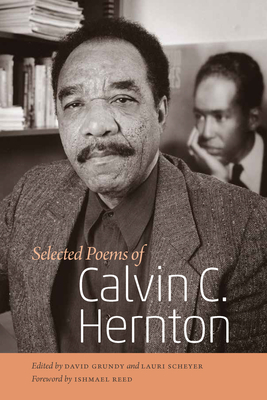Book Review: Selected Poems of Calvin C. Hernton
Reviewed by:
Robert FlemingBack in the day, Calvin C. Hernton, a poet, scholar, and essayist, was considered a literary maverick, an outspoken advocate of truth-telling. The author of ten books, including the highly controversial Sex and Racism in America (1965) and Coming Together: Black Power, White Hatred, and Sexual Hang-ups (1971), and three plays, Hernton established his name first as a poet of some renown, documenting poverty, war, genocide, gender bias, racism, and political justice in his works. All of this and more are included in the recently published, remarkable collection Selected Poems of Calvin C. Hernton.
Born in Chattanooga, Tennessee, Hernton got the traveling bug early on, living in New York, London, and Ohio. Although he was trained as a social worker for the New York Department of Welfare, he admired the political and cultural voices and content of W. E. B. Du Bois, Robert Hayden, and Langston Hughes. In those tortured years of stifling Jim Crow, Hernton was outraged by all he saw around him. “There is no ‘reason’ for the poetry I try to write; there is only cause,” he wrote in 1962. “The deformed, put-off dreams, the mutant hopes, futile efforts, spent living and spent dying. To the best of my frail honesty I write out of a deep, human, psychopathic need for salvation or murder…I love my country, I desire America.”
And America is on display in this book. Hernton doesn’t blink at reality, even if it’s staring him in the face. In his poem “125th Street, Harlem, U.S.A.” (for David Henderson, a cofounder of the Umbra Poets, an influential collective of poets and writers who were central to the Black Arts Movement) he writes:
Uptown black people pay
(a few ofays also)
Sugar brown girl in the alley
Bubblegum neon and processed hair
Fairyboys, doctormen, junkie, long slick limousines
The body smell of my woman, gasoline!
Civilization? Culture? Oh yes, I know!
Unafraid to tackle the society’s essential sexual myths that date back to slavery times, Hernton subverts the Black men as predators and Black women as immoral females willing to do anything. The notion of Black and White couplings still turns some people’s stomachs. In the poem “Oberlinian Quartet,” the author flips the myth to appeal to the reader of any persuasion:
Ella Johnson
Brown of skin
Long of legs
Stately statue of handsome and regal
Sculpture of your thighs
Splendor of your hips
Noble, sensuous, exquisite
Hernton realizes there was sexual tension between Black males and females, as well as interracial relations. He addresses these thorny issues in his fiction and nonfiction, but he placed sizzling, provocative one-lines of sex and eros to spice up his verses. Following his time in the 1960s in England, where he studied under the renegade Scottish therapist R. D. Laing, he joined in the Umbra collective of writers, on the Lower East Side, in Manhattan, with Askia Touré, Ishmael Reed, Lorenzo Thomas, Tom Dent, Steve Cannon, David Henderson, and Joe Johnson. Actors such as Louis Gossett, Roscoe Lee Brown, and Moses Gunn read their work, while musicians such as Archie Shepp, Thelonious Monk, Eric Dolphy, Cecil Taylor, and John Coltrane provided a musical background. Eventually, Hernton taught African, African American and Caribbean literature at Oberlin until his death in 2001.
Langston Hughes, one of his mentors, once said: “No writer I have come across Except Hernton has had the temerity to so frankly tackle that old bugaboo S-E-X as it relates to life, liberty, and the pursuit of integration.”
The writer and scholar, familiar with the aggressive discrimination of segregation, also recognized the toxicity of hate, which has mainly dominated American democracy. Hernton lashes out at its origins and its overseers of hate. In “Hate Poem,” he writes:
Your religion is killing
Your myths are lies
I want more, much more than you possess,
I want more than you are capable of wanting,
Your “founding fathers” were not fathers,
They were peckawood faggot hoodlums–
Hernton, who found comfort in the Scriptures and all things spiritual, could write lines that would dazzle the reader. The philosophy of the scholar would embrace the compassion and righteous intent of those seeking salvation and inner peace. In “Taurus by Aster Fire,” he penetrates the human condition of experience and consciousness, stating everyone needs someone, even if the bond is tiresome:
We have enjoyed and abused one another
We need other people to love and to hate
We need other people to mark occasion and
Shield away as well as consummate flesh,
Life and death and marriage and birth—
Also, Hernton was capable of displaying a few zingers, some tongue-in-cheek humor like Redd Foxx, Pigmeat Markham or Flip Wilson. In “Oberlin Negroes,” he gives a sly smile:
Black people
In Oberlin Ohio
Still say
“Colored.”
The white people
Don’t know
What to say.
When a collection such as Hernton’s work is published under the radar, critics and reviewers should take notice. His reputation, upon the book’s release, will leave its mark on readers who take time to sample its treasures. All Calvin Hernton wanted was to be respected and adored. We can understand that.

